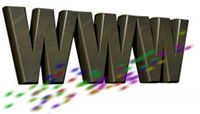 For some reason, a lot of Internet terms have multiple versions. This is partly because Web-related words are relatively new and haven’t had a chance to settle into standard, agreed-upon forms. Another reason is that American English words in general have a tendency to morph over time. Proving that America really is a democracy, unacceptable word forms sometimes become acceptable over the long haul if enough people use them.
For some reason, a lot of Internet terms have multiple versions. This is partly because Web-related words are relatively new and haven’t had a chance to settle into standard, agreed-upon forms. Another reason is that American English words in general have a tendency to morph over time. Proving that America really is a democracy, unacceptable word forms sometimes become acceptable over the long haul if enough people use them.
The following are the latest versions of some of the Internet terms we use all the time, based on rules set forth by The Chicago Manual of Style:
* Commands, icons, file names, keys and other technology-related terms
When writing about features in software or blogs, or on Web sites or keyboards, match the capitalization of the feature you’re mentioning. For example: “Hit Enter to access the page.” Enter is capitalized on keyboards, so it should be capitalized in this usage.
To further differentiate any of these terms, you can use italics, bold, a different font or quotes. If you’re writing about two types, you might want to use italics for one and bold for another: commands and file names. Whichever style you choose, be consistent.
* dot-com
This term should hyphenated, not written dot.com. (That would read dot dot com.) If used in a headline, capitalize both the d and the c: “Her Dot-Com Empire Made Her Millions Before She Jumped Out the Window.”
* e-mail, e-business, e-commerce, e-solutions, etc.
The e words should be lowercase and hyphenated, unless they appear at the beginning of a sentence. In that case, the e would be capitalized: “E-commerce provided a good living for him, but he preferred to dress like a homeless person anyway.”
* Internet
If you’re referring to the worldwide collection of Web sites, Internet should be capitalized. If you’re only referring to a network of computers, it should be lowercase.
* log in and its many variations
When you’re referring to logging into a site, the appropriate form is log on or log in (not logon or login). The same obviously applies to log off (not logoff). When you’re using the term as an adjective, however, it should be hyphenated: “She logged in on the log-in page.”
* online
This started as on-line, but it has now morphed into online — a perfect example of how language changes over time.
* pop-up
It’s appropriate to hyphenate the name for these annoying pages that disrupt your surfing.
* Web and Web site
At this point, Web is still treated as a proper noun, therefore both Web and Web site are capitalized. Since so many people already use web site or website, however, The Chicago Manual of Style editors predict that the uncapitalized form will eventually take over. Whichever form you use, be consistent.
* Video game names
Following the same rule as movie or book titles, video game titles should be italicized: “He sat in his chair and played Tomb Raider until his head fell off.”
You might also be interested in these related posts:
- Wordz We Misspell
- Grammar Myth #1
- Grammar Myth #2
- Keywords 101
- Using Quotations
- Writing Tools for Bloggers
- Social Networking Site Guide for Beginners
- Online Social Networking for Book Lovers
Copyright 2007 WordPlayBlog.com



















 I was excited to find this blog, which is filled with fun and useful tools to help bloggers. Here are just some of the tools you can find there:
I was excited to find this blog, which is filled with fun and useful tools to help bloggers. Here are just some of the tools you can find there: OpTempo offers free interviews and 125×125 ads
OpTempo offers free interviews and 125×125 ads It’s not enough to have your site or blog to rank well; it has to place highly for words that are closely related to your Web site or blog content. This is where an important part of search engine optimization comes in: keyword analysis, the art and science of identifying keywords that describe the focus of your Web property and are popular with the public. People who overlook this critical element usually have sites or blogs that don’t rank in search engines at all. If they do rank, they frequently do so for keywords that no one is looking for.
It’s not enough to have your site or blog to rank well; it has to place highly for words that are closely related to your Web site or blog content. This is where an important part of search engine optimization comes in: keyword analysis, the art and science of identifying keywords that describe the focus of your Web property and are popular with the public. People who overlook this critical element usually have sites or blogs that don’t rank in search engines at all. If they do rank, they frequently do so for keywords that no one is looking for.
 Just this morning there was a cautionary tale in the news about an Atlanta man’s e-mail to a woman who rejected him on Match.com. In an attempt to persuade this woman that she was missing out on a hot catch, he enumerated his many charms, including that he “has an 8.9 rating on HotOrNot.com, drives a Beemer, can bench press over 1,200 pounds and has had lunch with the secretary of defense.â€
Just this morning there was a cautionary tale in the news about an Atlanta man’s e-mail to a woman who rejected him on Match.com. In an attempt to persuade this woman that she was missing out on a hot catch, he enumerated his many charms, including that he “has an 8.9 rating on HotOrNot.com, drives a Beemer, can bench press over 1,200 pounds and has had lunch with the secretary of defense.â€
 Maybe it’s because I was born in the San Fernando Valley, home of the Valley Girl, that I don’t really care for the word awesome. I’m not sure whether Moon Zappa used it or not, but it seems very much like a Valley word to me. And I didn’t move all the way from California to the East Coast because I liked the Valley.
Maybe it’s because I was born in the San Fernando Valley, home of the Valley Girl, that I don’t really care for the word awesome. I’m not sure whether Moon Zappa used it or not, but it seems very much like a Valley word to me. And I didn’t move all the way from California to the East Coast because I liked the Valley. If you want to improve your blog or Web site by adding photos and don’t want to spend a dime to do it, Stock.Xchng, located at
If you want to improve your blog or Web site by adding photos and don’t want to spend a dime to do it, Stock.Xchng, located at